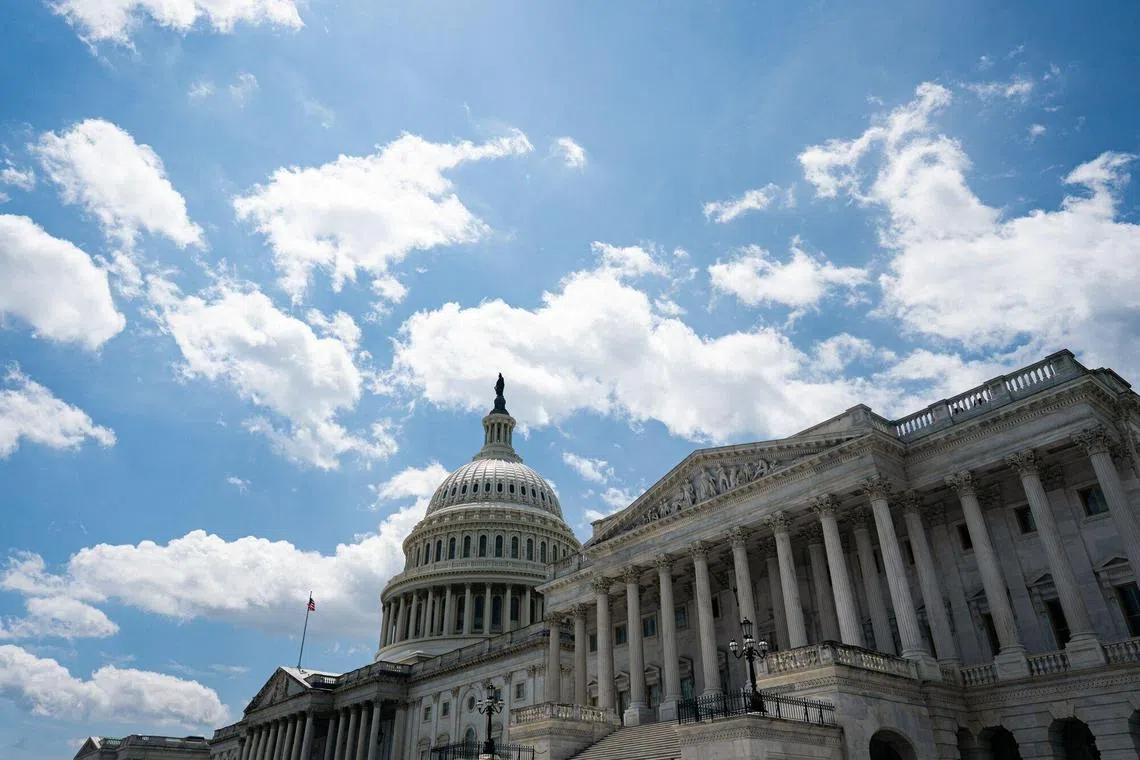Crypto market gets major win as US Congress passes stablecoin Bill
Sign up now: Get ST's newsletters delivered to your inbox

The US Congress delivered a watershed victory for the crypto industry on July 17, clearing the way for broader use of the technology in everyday finance.
PHOTO: BLOOMBERG
Follow topic:
WASHINGTON – The US Congress delivered a watershed victory for the crypto industry on July 17, passing the first federal legislation to regulate stablecoins and clearing the way for broader use of the technology in everyday finance.
Backed by Republicans and championed by US President Donald Trump, the Bill imposes federal or state oversight on US dollar-linked tokens that can move round the clock and across platforms.
Supporters say it could unlock faster, cheaper forms of payment – and bring legitimacy to a US$265 billion (S$340 billion) market that Citigroup analysts expect could swell to US$3.7 trillion by 2030.
The measure, which passed the House 308-122 with broad bipartisan support after clearing the Senate, is now on track to become law. Mr Trump personally lobbied Republican lawmakers to support it.
The legislation marks a political coming-of-age for the digital assets industry, which rebounded from the confidence-rattling collapse of Sam Bankman-Fried’s FTX crypto exchange
The stablecoin Bill is the centrepiece of a legislative push Mr Trump has dubbed “Crypto Week”. On July 17, the House also passed a broad crypto market structure Bill that still has to be considered by the Senate.
Democratic critics such as Senator Elizabeth Warren and Representative Maxine Waters warned that the new stablecoin regulatory regime will not do enough to protect consumers and could lead to pressure for government bailouts if issuers of the digital tokens fail.
But the nation’s most influential bankers are already grappling with the challenge the new measure is likely to accelerate. On earnings calls this week, JPMorgan’s Jamie Dimon, Bank of America’s Brian Moynihan and Citigroup’s Jane Fraser each described the upstart “digital dollar” as a potential threat to the banking industry’s grip on payments – and signalled they are preparing to respond.
The digital tokens could potentially eat at bank deposits, as some consumers move money into stablecoin accounts.
It could also broaden the stablecoins’ use in cross-border money transfers and in payments, and open the way for everyone from banks to card networks to technology firms issuing their own stablecoins. In recent weeks, a slew of major banks including JPMorgan said they are looking at being involved in stablecoins.
US-based crypto companies that issue dollar-denominated stablecoins, such as Circle Internet Group, may be in the most immediate position to gain.
While Circle finished on July 17 up less than 1 per cent, it has jumped 25 per cent to US$235.08 this week. Coinbase Global, which has a revenue-sharing agreement with Circle, rose 3.2 per cent to US$410.75, a record high. Bitcoin was down slightly in the last 24 hours, after hitting its all-time high of about US$123,000 on July 14, partly on optimism about the stablecoin Bill’s prospects.
Stablecoins so far have largely been used for transactions related to the cryptocurrency market rather than business payments.
The legislation “provides the stablecoin industry with the degree of legitimacy they have been craving”, said Dr Eswar Prasad, a senior fellow at the Brookings Institution. “And the bonus is that it comes with what I view as relatively light-touch regulation.”
The measure sets regulatory rules for dollar-backed stablecoins, including a requirement for companies to hold dollar-for-dollar reserves in short-term government debt or similar products overseen by state or federal regulators.
Mr Trump and his family have ties to a series of digital-asset businesses, including World Liberty Financial, a platform that has its own branded token as well as a stablecoin.
Crypto ventures have added at least US$620 million to Mr Trump’s personal fortune in the span of months, according to the Bloomberg Billionaires Index.
Some Democrats unsuccessfully tried to add a provision to the legislation that would bar elected officials such as Mr Trump and their families from stablecoin business ventures. BLOOMBERG

